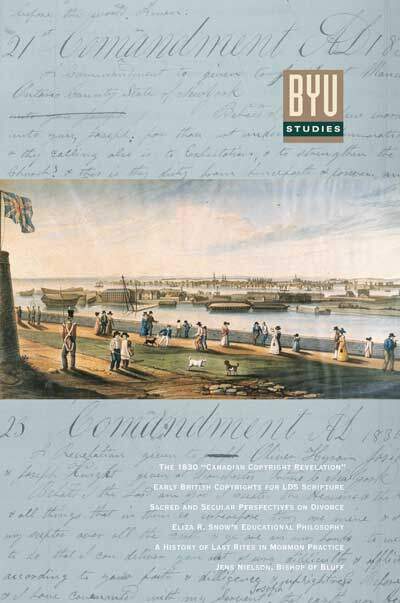Volume 50:2 (2011) Print
Print:
19 in stock
$9.95
BYU Studies vol. 50, no. 2, begins with Stephen Ehat’s thorough historical, geographical, and legal context for the so-called Canadian copyright revelation. Once considered lost, this revelation came to light with the recent discovery of the Book of Commandments and Revelations and has been published as part of the Joseph Smith Papers. Next, Edward Carter examines British copyright law and the efforts by the Quorum of the Twelve Apostles in the 1840s to secure copyright protection in England for the Book of Mormon and the Doctrine and Covenants. Jonathan Stapley writes on changing Mormon practices regarding death: prayers and anointings, preparation of the body for burial, and grave dedications. David S. Carpenter tells of the trials encountered by Mormon settlers in the struggling ranching community of Bluff, Utah, in the 1880s, as they competed against the elements and commercial ranchers. Alan Hawkins and Tamara Fackrell share guidance from Church leaders and recent secular research regarding divorce. Jolene Merica explores the educational philosophy of Eliza R. Snow, general president of the Relief Society and Zion’s Poetess, as evidenced in four of her poems. The issue also contains poetry and book reviews.
BYU Studies vol. 50, no. 2, begins with Stephen Ehat’s thorough historical, geographical, and legal context for the so-called Canadian copyright revelation. Once considered lost, this revelation came to light with the recent discovery of the Book of Commandments and Revelations and has been published as part of the Joseph Smith Papers. Next, Edward Carter examines British copyright law and the efforts by the Quorum of the Twelve Apostles in the 1840s to secure copyright protection in England for the Book of Mormon and the Doctrine and Covenants. Jonathan Stapley writes on changing Mormon practices regarding death: prayers and anointings, preparation of the body for burial, and grave dedications. David S. Carpenter tells of the trials encountered by Mormon settlers in the struggling ranching community of Bluff, Utah, in the 1880s, as they competed against the elements and commercial ranchers. Alan Hawkins and Tamara Fackrell share guidance from Church leaders and recent secular research regarding divorce. Jolene Merica explores the educational philosophy of Eliza R. Snow, general president of the Relief Society and Zion’s Poetess, as evidenced in four of her poems. The issue also contains poetry and book reviews.
Additional information
| Weight | 13 oz |
|---|---|
| Dimensions | 9 × 6 × .5 in |


